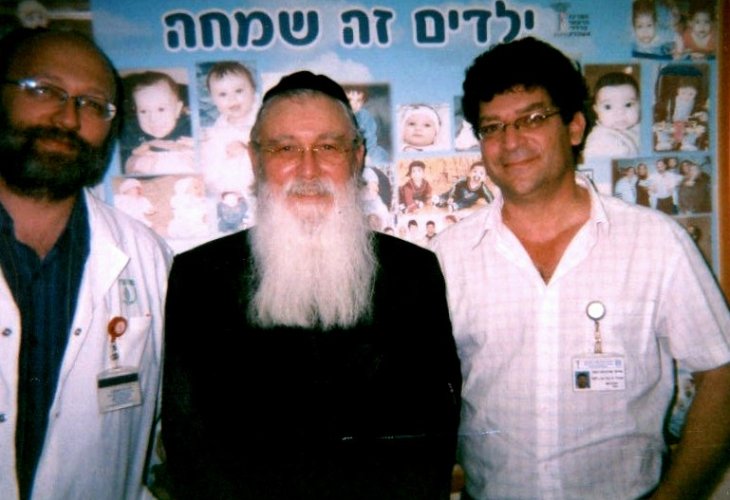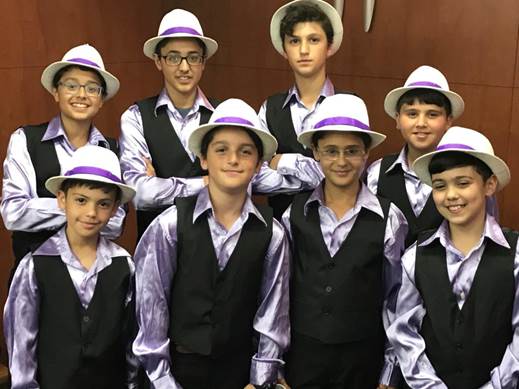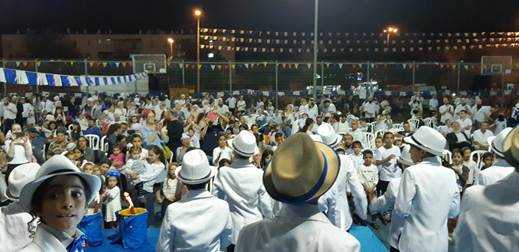The Man Behind Jerusalem's Blossoms Reveals: "It All Began When I Was Injured in an Attack"
After 44 years and performances in over 38 countries, Chanan Avital, the man behind Jerusalem's Blossoms, opens up about everything: the countries where they have performed, the surprising call from the White House, the severe injury from the attack, and the decision to never leave the field.
 (In the circle: Chanan Avital)
(In the circle: Chanan Avital)The grand stage in the streets of Jerusalem was surrounded by thousands participating in the traditional flag dance of Jerusalem Day, dancing and singing along with the choir performing on stage. The song that got everyone moving was the hit "Shevet Achim Va'achayot," launched by Galgalatz for Independence Day. But it wasn't the original line-up of artists performing it; instead, it was Jerusalem's Blossoms Choir. Standing beside them on stage was the choir's manager, Chanan Avital, proud of each one of them as if it were their first performance.
However, this was far from their first time. For 44 years, Jerusalem's Blossoms Choir has performed at every corner of the globe. "Throughout the years, we have released more than 700 songs and performed in over 38 countries," recalls Avital. "We appeared dozens of times in each of these countries. I don't think I can even count the number of our international performances."
44 years of activity is an extraordinary achievement by any standard, but although today Jerusalem's Blossoms seems like a given, an integral part of the Hasidic music scene — their beginning was difficult, born out of tragic circumstances.
The Attack Where It All Began
"It was a time when there were many 'Blossoms' bands," Avital takes me to the beginning of the story. "'London's Blossoms' was the hottest name in Hasidic music, but there were many others. Already as a teenager in a religious high school in Safed, my headmaster saw that I lived and breathed music and had a hard time studying all day, so he got me a record player and two albums. The first was by Rabbi Shlomo Carlebach, and the second belonged to a choir called 'Blossoms of the Israel Union.' I don't think anyone today even knows them, but the biggest hits of those days were theirs. Songs like 'Who is the man who desires life' and 'The whole world is a very narrow bridge' were by the choir and were written by Rabbi Baruch Chait, who founded the Merava Yeshiva. Those albums won me over. I connected with Hasidic music back then and haven't left it since."
The impression those albums left on Avital in those days shaped him musically. Above all, he connected with the music created by Rabbi Shlomo Carlebach. When Carlebach came to Israel for a concert tour, Avital was sure to be there in the audience, as close as possible. "I was about 15 when Carlebach came for his tour in Israel. The show was called 'Hasidic Pop.' It was a joint performance by Carlebach and Arik Einstein, but you could see that most came because of Carlebach. One of the performances was in Safed, and all 1000 tickets sold out pretty quickly."
The connection between Carlebach and Avital formed during that performance continued for years after. Most of his holidays were spent in Jerusalem when Carlebach was there. However, then came the event that changed Avital's life.
On Friday, 25th of Tammuz 5735 (4th of July, 1975), around 9:30 AM, a refrigerator was brought to Zion Square by a Palestinian terrorist. The refrigerator aroused the suspicion of several citizens, but when they opened its door, it was found empty because the ammunition, composed of two mortar bombs, was hidden in its walls. A citizen who called the police center 100 struggled to obtain police assistance. The refrigerator exploded around 10:00 AM, before the police arrived, causing 13 deaths and about 70 injuries. Four days later, 21 of the injured remained in hospitals. After the death of two of the injured, the death toll rose to 15. It was one of the largest attacks at that time. Avital was among the most severely wounded from that attack.
"For almost a year, I was in and out of the hospital. I had just met a relative who was supposed to come play at the young religious club I was running at the time. We parted ways; he got on his scooter, and two minutes later, the explosion occurred. I stood very close to the refrigerator and was severely injured. Many people from the music world came to visit me during those days, like London's Blossoms, and above all, Rabbi Shlomo Carlebach. Years later, I learned he composed the song 'Because the Time Has Come' about me. He mentioned this in an interview back then. During all that time, I had plenty of time to think with myself about what I was going to do in life. I knew it would somehow be related to music, and when I could finally stand on my feet — the idea came to me to organize a Hasidic children's music festival. There were many festivals in those days, and I saw that this was an empty niche with many demands."
Avital thought big. He used the compensation money he received after the attack to rent the Binyanei Ha'uma hall for the event. He evaluated a long list of children for the festival, and they became the basis for Jerusalem's Blossoms, the first generation. "In fact, there already was a group called Jerusalem's Blossoms that was established 13 years earlier," he notes, "It was founded by Yigal Tzalikh, who was behind London's Blossoms. But the choir didn't last very long, and Tzalikh returned to London. We basically just took the choir's name, which was actually in Bnei Brak, but we built everything anew."

Why did you call it 'Jerusalem's Blossoms,' even though the name was already taken?
"It was clear we needed to call it 'Blossoms' because everyone was called 'Blossoms' in those days. Besides, the name wasn't really taken since the choir hadn't existed for many years. I recreated it, and it has been a part of me for 44 years."
You mention many 'Blossoms' choirs from those days, but almost none exist today. How have you survived all these years?
"For me, it was a profession, not a hobby. To succeed for so many years, you have to be one hundred percent dedicated to it. It's not something you can do offhandedly. It's important to understand that it's also not easy. You can't always succeed. I've had ups and downs, highs and lows, a roller coaster. We had times when we were on the Israel-Paris line as frequently as others were on the Jerusalem-Tel Aviv line. Every two to three weeks, we flew there. Weddings, community events, you name it. Each time we flew with about 40 kids. Those were crazy times. We performed with Enrico Macias, one of the greatest singers of those days, on the same stage in Paris. But it wasn't we who were his guests; he was ours."
"There is a Great Thirst Around the World for Jewish Culture"
Today, Avital is 65 years old. He has been a resident of Petah Tikva for thirty years but admits he never managed to connect with it completely. His heart remains unmistakably Jerusalemite. The title of Jerusalem accompanies him in every step he takes, both in Israel and abroad. He has visited abroad quite a bit with the choir's performances, but the audience could surprise some readers. The "Jerusalem’s Blossoms" performances worldwide were mostly invited by Jewish communities, but a large share of those attending these performances were not Jewish but locals from those countries. "We've performed many times in Brazil, mainly in the city of Sao Paulo. It's a city with 150,000 Jews, a huge presence, and they invited us quite often. Day after day, we performed there, and each night — all tickets, 3,000 each time, were sold. And then we saw that our performances attracted quite a number of non-Jewish audiences."
Did that surprise you?
"At first, we were surprised, but soon we realized that's how it is there. There's not much anti-Semitism in Brazil, at least not in Sao Paulo, and non-Jewish people regularly attend performances related to Jews and Judaism. They saw a poster with kids wearing kippahs and Jerusalem, and that attracted them to come in droves. And don't think that I performed with the Brazilian Philharmonic or something like that, it was just us — and they came evening after evening. But it wasn't only there. In Morocco, I performed about 15 times. We were the first Israeli artists to perform in Morocco about 17 years ago. And what a reception we got."
Among all the places worldwide where the choir has performed, perhaps the most interesting is the city of Birobidzhan. Birobidzhan is the capital of the Jewish Autonomous Region in Russia. The district is located at the far east of the country, on the border with China. It was established in the early years of the Soviet Union when a strategic decision was made regarding the treatment of Jews. The leadership at the time saw two "problems" among the Jews. The first was, of course, Judaism itself, which posed a threat to the atheism principle that characterized the Soviet Union. The second was Zionism, which Stalin saw as one of the main enemies of communism. The idea was to send the Jews far from Israel, to a relatively isolated point, where they would have something like a national home. The name of the district and its Jewish status have remained to this day, even though the Soviet Union no longer exists and the percentage of Jews residing there is a single percentage point. Less than 1,800 people. "Amazing to see that. You walk through the streets and feel like you are in Israel. All the streets are named after Israeli authors and poets. Amazing."

The Jewish district, as part of its defined Jewish culture, hosts a massive klezmer festival once every two years. Two years ago, Avital and the choir were invited to perform at the festival. "It's the biggest klezmer festival in the world. Two hundred thousand people gather there for several days to hear Jewish music. When you're there, you suddenly realize how much more there is to learn about Jewish music. Everyone is dressed like Jews, playing Jewish music on violins and clarinets, and more. An unparalleled experience. And the most amazing part is that nobody there is Jewish."
So what attracts so many non-Jews to Jewish music and culture?
"Apparently, music ultimately connects everyone. We constantly underestimate anything related to tradition and Judaism. When was the last time you heard a new Hasidic song enter Galgalatz’s playlist? Many years ago. What's entering today, the likes of Ishay Ribo and that style, it's beautiful, but it's not the authentic Jewish music. However, the non-Jewish public worldwide is very thirsty for it. They seek it and want to consume this culture."
From Petah Tikva to the White House
Avital doesn't stop creating for a moment. He claims that today it takes him about two hours to write a song. That's how it is when you have hundreds of songs behind you. But even he couldn't believe his latest song would pick up so much traction.
"I wrote a song called 'Super Trump,' about the President of the United States. Honestly, I just wrote it out of fun. A few days later, I read in the newspaper that the city of Petah Tikva decided to name a square in the city after him. The ceremony is supposed to be in about a month. I sent the song to the mayor, and after he heard it — he informed me that we would be performing the song at the ceremony. From there, it picked up momentum, and I never dreamed it would happen. Someone uploaded it online a few days ago, and it went viral. I don't know how, but someone from the White House saw it and spread it even further. Since then, I've been bombarded with calls. First of all, they called from the White House itself. But beyond that, many people from all over the world, including many journalists from the biggest networks, like the BBC, are requesting interviews and all that. All for a song I wrote just for fun."
Even though at his age, he is close to retirement, Avital doesn’t even consider stopping. "I always love to look forward. True, it's nice to reminisce about the past and enjoy nostalgia, but I can't stop creating. I get excited about writing a song. I feel like every song I create is like a new baby I've brought into the world. Each time anew, when I step on stage and see the orchestra and the choir, it just moves me. I don't think I could ever give up this amazing feeling."

